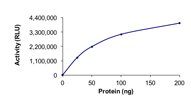
SPHK1, Active(S17-102G)
FOR BULK ORDER REQUESTS PLEASE CONTACT US
Description :Recombinant full-length human SPHK1 was expressed by baculovirus in Sf9 insect cells using an N-terminal GST tag.
Species :Human
Tag :GST tag
Expression System:Sf9 insect cells using baculovirus
Sequence :Full length
Genbank Number :BC008040
Specific Activity :Sample Kinase Activity Plot. For specific information on a given lot, see related technical data sheet.
Purity :Sample Purity Data. For specific information on a given lot, see related technical data sheet.
Storage, Stability, and Shipping :Store product at –70oC. For optimal storage, aliquot target into smaller quantities after centrifugation and store at recommended temperature. For most favorable performance, avoid repeated handling and multiple freeze/thaw cycles.
Applications :Kinase Assay
Molecular Weight :~71 kDa
Gene Aliases :SPHK
Scientific Background :SPHK1 catalyzes the phosphorylation of sphingosine to form sphingosine-1-phosphate (SPP) which is a novel lipid messenger with both intracellular and extracellular functions. Various stimuli increase cellular levels of SPP by activation of SPHK1 (1). Competitive inhibitors of SPHK1 block formation of SPP and selectively inhibit cellular proliferation induced by a variety of factors. SPHK1/sphingosine-1-phosphate pathway contributes to colon carcinogenesis. SPHK1 plays a key role in the generation and release of proinflammatory mediators triggered by anaphylatoxins from human macrophages and also is involved in the process of immune cell motility (2).
References :
1. Xia, P. et al: Sphingosine kinase interacts with TRAF2 and dissects tumor necrosis factor-alpha signaling. J. Biol. Chem. 2777996-8003, 2002.
2. Pappu, R. et al: Promotion of lymphocyte egress into blood and lymph by distinct sources of sphingosine-1-phosphate. Science 316295-298, 2007.
Product Sheets (By Lot #) :
Research Areas :Angiogenesis, Apoptosis/Autophagy, Cardiovascular Disease, Invasion/Metastasis, Lipid Kinases, Neurobiology, PKA/PKC Pathway
